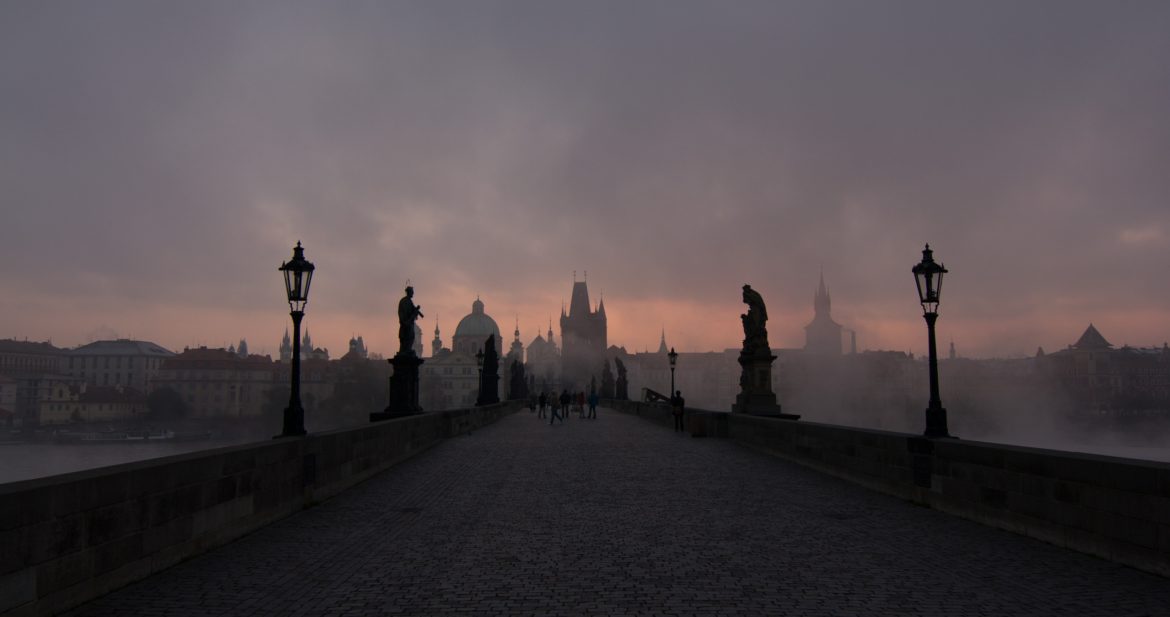Worth Standing For: Macbeth at the Folger Theatre
I realize that it’s probably unfair to give a rave review to a show that is completely sold out through its already–extended run. But the production of Macbeth currently running at the Folger Theatre is so exciting, innovative, and spectacularly good that it’s well worth a standing–room ticket. (Spoiler alert: if you want to be surprised by the staging and special effects, read no further until after you’ve see the play yourself.)
Billed as co–conceivers and co–directors, Teller (of the magic act/performance art duo Penn and Teller fame) and Aaron Posner have devised a production that emphasizes both the brutality and the much less obvious humor in the play. Yes, as some have noted, there is a lot of blood on display here. Sometimes it’s in the service of realism, as in the convincingly staged fight scenes. But blood is also used here to convey states of mind, to bring us nearer the characters, as in Lady Macbeth’s sleepwalking scene. As she frets and tries to wipe her hands of the blood she imagines is still on them, blood begins to drip, then pour from her palms; instead of seeing what the doctor and nurse observing her see, we the audience enter Lady Macbeth’s unraveling mind. By the end of the scene, her white nightgown is stained with blood, and her face is covered in it. How appropriate for our last glimpse of the killer queen.
By emphasizing the play’s opportunities for humor, Teller and Posner give us a welcome break from all the gore. I’ve seen many productions of this play, but never one in which the porter’s speech, a kind of extended knock–knock joke, was so hilarious. (In fact, I was convinced that new text had been introduced; checking my copy at home, I found that they hadn’t added a word.) Part of the effectiveness here has to do with a really fine actor, Eric Hissom, who plays the porter as well as three other roles – the doctor, one of the murderers, and one of the Weird Sisters.
All three of the sisters are played by men, and they’re the scariest trio I’ve ever seen. Some of the best magic in the show is in their scenes: one disappears when Macbeth attempts to grab her; they pull from their cauldron a hideous talking baby (mechanical) and a young boy (real), though the cauldron is on a platform and we can clearly see empty space underneath it. How different this interpretation is from one I saw at the Shakespeare Theater a few years ago, where the Weird Sisters were three slitheringly sexy women who wrapped themselves around Stacy Keach’s overwhelmed Macbeth. This Macbeth, played by Ian Merrill Peakes, seems never to be overwhelmed by anything. And though the sisters frighten him at first, he loves their prediction of his kingship too much to question just how the crown might be gotten.
Peakes has a big, expressive voice and a physical toughness that is just right for the true badass Macbeth becomes. In fact, nearly all the actors in this production are wonderful. Other standouts for me were the young Malcolm, played with a fine combination of sweetness and toughness by Scott Kearns, and the three Macduffs. The scene between Lady Macduff, played Karen Peakes, and her young son, played by Ben Cook, in which she tries to convince him that his father is dead, is truly heartbreaking.
The highlight for me in this strong cast is Cody Nickell as Macduff. I’ll admit it – Macduff is one of my favorite of Shakespeare’s characters, and I find his lines, particularly the “all my pretty ones” speech he delivers upon being told the murder of his wife and all of their children, to be some of the most beautiful poetry in the play. Nickell gives us a Macduff of wide emotional range, with a tender heart and a clever head; he is equally convincing as a lover, a family man, and a fighter. Our final sight of him, stripped the waist, blood drenched, and howling, makes his “triumph” over Macbeth a complicated thing, indeed. Nickell is the best Macduff I’ve seen.
If there’s a weak link here, it’s Kate Eastwood Norris as Lady Macbeth. Granted, it’s a tough role – while Macbeth turns into a murderer before our eyes over the course of the play, she enters ready to kill. Her opening speech lacks the necessary fire, and it takes a while to get used to the thinness of her voice, particularly up against Peakes’ strong baritone. She is also badly served by whoever picked her hairstyle – while the pared–down costuming and Lady Macduff’s updo aim for a “period” style, Lady Macbeth’s straight, layered locks are inexplicably contemporary. Norris was stronger in the second half of the play, and by the sleepwalking scene she had me. But my theater going pal Sara was less convinced, and thought it a case of very bad casting.
There’s a lot more to be said for the magic Teller brings to this production – the dagger Macbeth imagines he sees early on in the play actually appears, and the first appearance of Banquo’s ghost made everyone in the theater jump – which is at every turn appropriate to this spooky, moving play. If I weren’t off to England today for the Oxford Fringe Festival, I’d get standing room tickets to see it again. My advice to you is to get some comfortable shoes and go for it – it’s unlike any production of the Scottish play I’ve ever seen, and by far the most imaginative and powerful.

Leave a Reply